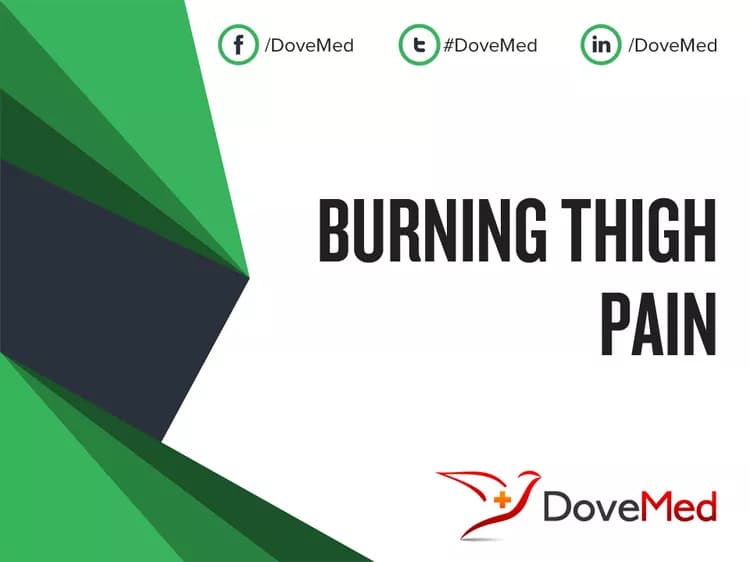What are the other Names for this Condition? (Also known as/Synonyms)
- Bernhardt-Roth Syndrome
- Femoral Cutaneous Nerve Syndrome
- Lateral Femoral Cutaneous Nerve Entrapment
What is Burning Thigh Pain? (Definition/Background Information)
- Burning Thigh Pain is a painful condition characterized by tingling, numbness, and burning pain within the outer part of the thigh
- It is caused by compression to the lateral femoral cutaneous nerve, which is the nerve that provides sensation to the skin surface of the thigh
- On an average, this condition predominantly seems to occur in individuals, between the ages of 40-60 years old
- Conservative treatment measures, such as application of ice, rest, and use of medications can help individuals with Burning Thigh Pain. The symptoms normally resolve with early treatment, or in some cases, spontaneously
Who gets Burning Thigh Pain? (Age and Sex Distribution)
- Although, individuals of all ages, race, and ethnic groups may experience a Burning Thigh Pain condition; it is often observed in individuals between the ages of 40 and 60 years
- Women have a slightly higher risk of developing this condition than men, though both genders are affected
- Burning Thigh Pain rarely develops in children
What are the Risk Factors for Burning Thigh Pain? (Predisposing Factors)
Risk factors associated with Burning Thigh Pain may include:
- Athletics: Physically-active individuals or those who participate in sports, have an increased risk of developing this disorder
- Gender: Women seem to have a higher risk of developing Burning Thigh Pain than men
- Age: Middle-to-older aged adults, between 40-60 years old
- Obesity: Excess body weight could put abnormal pressures on the lateral femoral cutaneous nerve
- Diabetes: This may cause a thigh nerve injury
- Pregnancy: Excess body weight associated with pregnancy can put increased pressure on the nerves
- Direct trauma: Any significant traumatic event resulting in injuries to the pelvis, such as caused by an automobile, motorcycle, or bicycle accident, may also damage the pelvic nerves
It is important to note that having a risk factor does not mean that one will get the condition. A risk factor increases ones chances of getting a condition compared to an individual without the risk factors. Some risk factors are more important than others.
Also, not having a risk factor does not mean that an individual will not get the condition. It is always important to discuss the effect of risk factors with your healthcare provider.
What are the Causes of Burning Thigh Pain? (Etiology)
Any of the following factors causing damage to the lateral femoral cutaneous nerve can result in Burning Thigh Pain:
- Obesity: Excess body weight associated with obesity may cause an increased or abnormal pressure on the lateral femoral cutaneous nerve, which may result in the disorder
- Direct trauma: Any significant traumatic event, such as an automobile, motorcycle, or bicycle accident, which directly impacts the thigh nerves
- Diabetes: Any nerve injury to the thigh associated with diabetes
- Sports-related injury: Individuals, who are physically active or participate in sports, may develop Burning Thigh Pain
What are the Signs and Symptoms of Burning Thigh Pain?
Some sign and symptoms of a Burning Thigh Pain include:
- Noticeable pain on the outer part of the thigh
- Burning or tingling sensation surrounding the affected area
- The skin is more sensitive to a light touch, than a firm pressure
How is Burning Thigh Pain Diagnosed?
Common tests a physician may use to diagnosis Burning Thigh Pain include:
- Physical examination and medical history: During a physical examination, the physician may ask general questions about any recent surgeries, injuries to the hip, physical activities or sports one participates in, which require a set of repetitive movements, etc.
- X-ray: X-rays are used to help identify any bone abnormalities that may be applying pressure on the nerves
- Magnetic resonance imaging (MRI) scan: A MRI scan may be ordered, if a tumor or an abnormal growth is believed to be the cause of excess nerve pressure
- Computerized tomography (CT) scan: A CT scan is another test a physician might order, if he/she suspects that a tumor or an abnormal growth may be the cause for excess pressure on the nerve
- Electromyography (EMG): An EMG shows the electrical activity of the muscle during rest and during muscle contraction. Examining the electrical activity may help a physician study and identify any muscular or neurological disorders
- Nerve conduction velocity (NCV): Nerve conduction velocity shows the speed at which electrical signals move through a nerve. A slowing of nerve conduction speed may help identify nerve damage (if any)
Many clinical conditions may have similar signs and symptoms. Your healthcare provider may perform additional tests to rule out other clinical conditions to arrive at a definitive diagnosis.
What are the possible Complications of Burning Thigh Pain?
Complications associated with Burning Thigh Pain include:
- Chronic pain: If the condition is left untreated, it may result in chronic pain
- Permanent disability: If the condition is treated properly, then it does not usually cause any serious complications. However, if left untreated, this condition can cause permanent nerve damage, tingling sensation, and numbness within the thigh
How is Burning Thigh Pain Treated?
The treatments associated with Burning Thigh Pain focuses on decreasing the compression on the nerve. The conservative treatment measures may include:
- Rest: Any activity that aggravates the thigh condition further should be avoided. The physician may advise the individual to refrain from participating in certain activities, until the symptoms get better
- Ice: Applying ice to the hip should help reduce any pain
- Non-steroidal anti-inflammatory medication: Medications, such as ibuprofen and naproxen, can help decrease the pain around the thigh
- Corticosteroids: Steroidal medications, such as prednisone, may help decrease the inflammation and increase range of motion of the thigh
- Antidepressants and anticonvulsants: Antidepressants, such as amitriptyline, and anticonvulsants, such as gabapentin, may help decrease pain resulting from an injured nerve
- Ultrasound guided nerve blocks
- Peripheral nerve stimulator if it is caused by lateral femoral cutaneous nerve involvement
Surgical interventions are rarely used for Burning Thigh Pain; they are not always successful in treating the condition.
How can Burning Thigh Pain be Prevented?
A few recommendations to help prevent Burning Thigh Pain include:
- Alcohol consumption: Excessive consumption of alcoholic beverages may increase one’s risk of developing Burning Thigh Pain. In such cases, the reduction or elimination of alcohol consumption can help
- Healthy diet: Individuals, who maintain a healthy diet, may decrease the chance of developing this neurological disorder
- Tight clothing: Constantly wearing clothing that is too tight, such as a tight pant or belt, may put abnormal pressure on the nerves
- Weight loss can be helpful in decreasing pressure on the nerves
- Controlling diabetes
- Wearing protective gears during contact sports
What is the Prognosis of Burning Thigh Pain? (Outcomes/Resolutions)
- If Burning Thigh Pain is quickly identified and treated, the signs and symptoms associated with the condition usually resolve and the compressed nerve heals
- The resolution of this condition may take between a few hours to several weeks in some cases
- If the nerve compression is linked to pregnancy, the condition usually improves after childbirth
However, Burning Thigh Pain may be self-limiting and may ultimately heal suddenly without any treatment.
Additional and Relevant Useful Information for Burning Thigh Pain:
Burning Thigh Pain is also known as Femoral Cutaneous Nerve Syndrome.
Related Articles
Test Your Knowledge
Asked by users
Related Centers
Related Specialties
Related Physicians
Related Procedures
Related Resources
Join DoveHubs
and connect with fellow professionals



0 Comments
Please log in to post a comment.